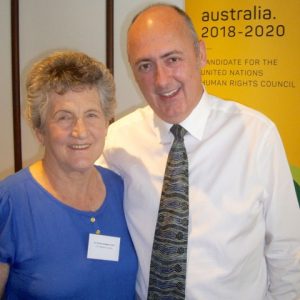OPCAT being ‘actively’ considered
Report on DFAT-AGD-NGO forum on human rights: 8 February 2016
By Civil Liberties Australia president Dr Kristine Klugman
Fifty organisations attended at this annual forum, which is for officers from Department of Foreign Affairs and Trade (DFAT) and Attorney Generals Department (AGs) to outline the current situation, and the activities, in relation to the DFAT and AGs branches concerned with human rights who deal with the UN on behalf of Australia.
Officers reported on the status of the UN Human Rights Council, the Universal Periodic Review 2015, the UN General Assembly Third Committee, International Thematic meetings and Bi-lateral Engagements. Chatham House rules were adopted, meaning reporting the gist of what was said is OK, but not who said it.
 Overall, the forum was well organised and conducted, with officers frankly describing the various issues. The atmosphere was friendly and co-operative. NGO delegates took the opportunity for the adequate time allocated for questions and discussions, as well as to network.
Overall, the forum was well organised and conducted, with officers frankly describing the various issues. The atmosphere was friendly and co-operative. NGO delegates took the opportunity for the adequate time allocated for questions and discussions, as well as to network.
PHOTO: CLA President Dr Kristine Klugman with DFAT-AGD-NGO forum chair, Dr Lachlan Strahan.
As delegate and president as CLA, I asked two questions. The first related to when the Optional Protocol to the Convention against Torture (OPCAT) would be ratified by the federal government. The response was that the federal government was still considering ratification. CLA’s letter to the Prime Minister on 26 November 2015 re ratification of OPCAT received a reply on 4 February 2016, from James McGrath, Assistant Minister to the Prime Minister, stating: “The Government is actively considering whether it will ratify OPCAT.” That’s hardly progress: the Labor and Liberal governments have been contemplating their navels about the issue for years.
OPCAT is an international agreement aimed at preventing torture and cruel, inhuman or degrading treatment or punishment.On 28 February 2012, OPCAT was tabled in the Commonwealth Parliament. The treaty was referred to the Joint Standing Committee on Treaties (JSCOT) for consideration.
Witnesses called on JSCOT to recommend that the Australian Government ratify OPCAT and work promptly towards its full implementation in Australia. On 21 June 2012, JSCOT tabled its report which supported OPCAT and recommended that binding treaty action be taken. But, even with bipartisan support in the Australian Parliament since 2009, OPCAT not been ratified, despite 64 organisations calling for that in September 2014.
The reasons the Coalition government and indeed the Labor party in government have been reluctant to sign is because – when it is concluded – the treatment of asylum seekers in off-shore detention would come under international scrutiny, as would the conditions in our jails. No Australian government is prepared to be held accountable for these situations.
The other question I raised was how the government’s announced advocacy strategy and plan for eliminating the death penalty worldwide was to be implemented by our overseas diplomats. The response was that the strategy was being developed, and should be ready for action by mid-year.
Apart from the death penalty, the issues raising most attention during the briefing were the Australian government’s answer to 290 criticisms raised in the Universal Periodic Review (UPR) by the UN on asylum seekers, aboriginal incarceration, gender and disability, and the Border Force. The situation of refugees in the Middle East, forced marriages and rights of older Australians were also raised, amongst many other matters of current concern.
Australia’s bid to be elected in October 2017 to the Human Rights Council was raised by Foreign Minister Julie Bishop MP in her fleeting visit to address delegates. The numbers on the HRC would be more problematic in the next term, with some countries’ presence being ‘pernicious’ She did admit “Australia is not perfect in the field of human rights” (!)
The elephant in the room was the issue of continuing off-shore detention of asylum seekers, which no-one wanted to face,probably because it was assumed to be a fruitless exercise, in view of the High Court’s ruling against babies and their families just the day before the gathering.

